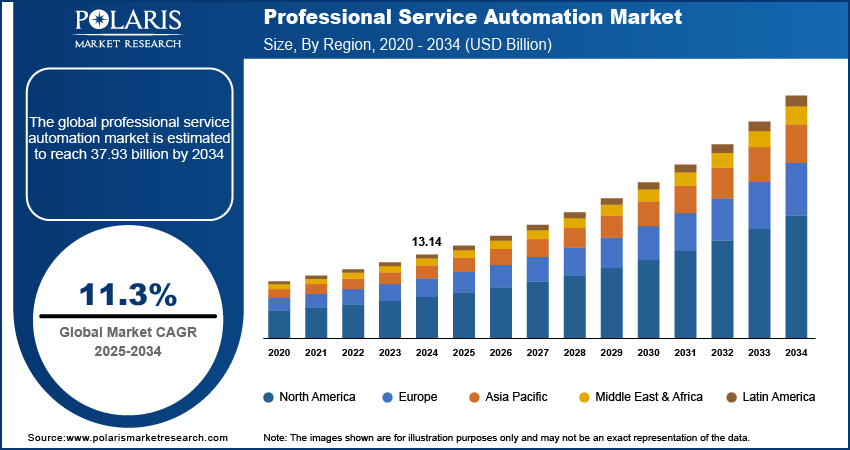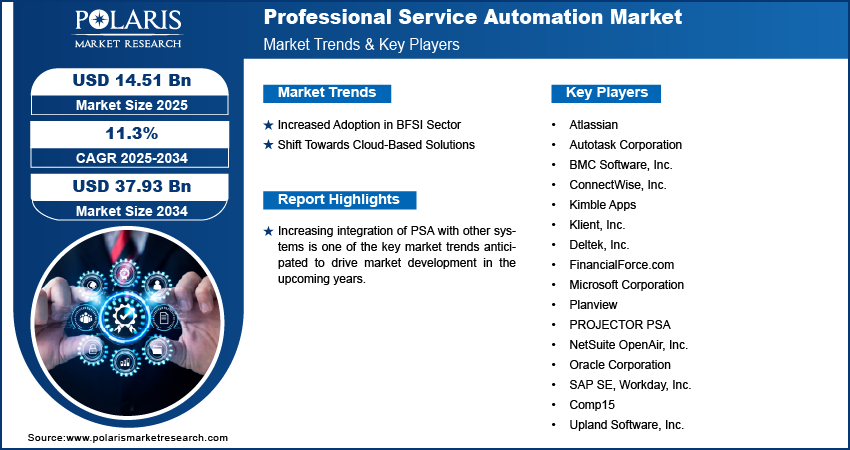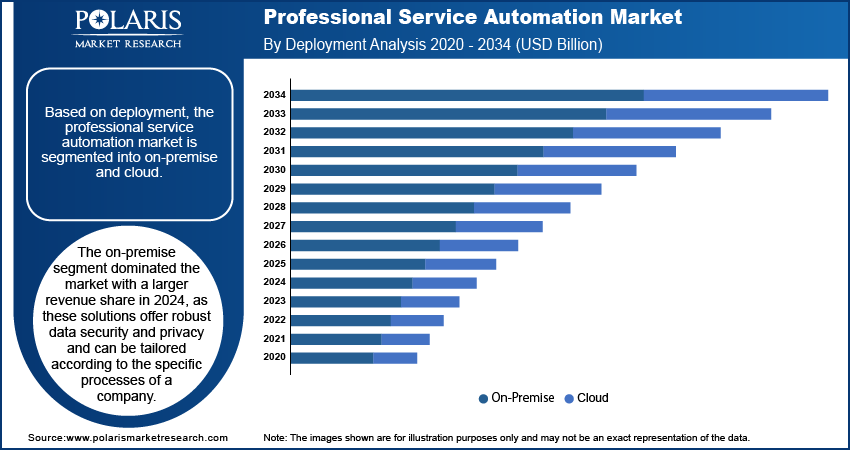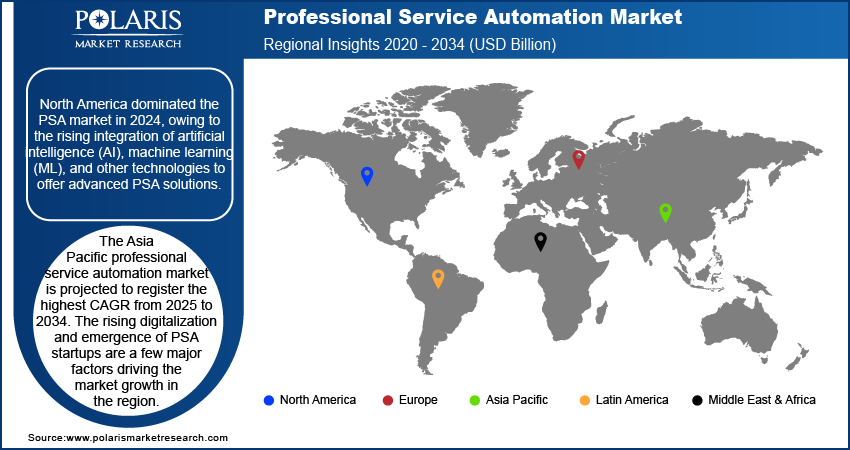
Professional Service Automation Market Size, Share, Trends, Industry Analysis Report: By Deployment (On-Premise and Cloud), Organization Size, End-Use Industry, and Region (North America, Europe, Asia Pacific, Latin America, and Middle East & Africa) – Market Forecast, 2025–2034
- Published Date:Jan-2025
- Pages: 117
- Format: PDF
- Report ID: PM1413
- Base Year: 2024
- Historical Data: 2020-2023
Professional Service Automation Market Overview
The global professional service automation market size was valued at USD 13.14 billion in 2024. The market is projected to grow from USD 14.51 billion in 2025 to USD 37.93 billion by 2034. It is projected to exhibit a CAGR of 11.3% from 2025 to 2034.
Professional service automation (PSA) is a software solution that enables companies to streamline their operations, boosting efficiency, productivity, and profitability. The solution offers a range of features such as project management, invoice management, time management, and resource allocation. PSA helps create a consistent process for planning, managing, and measuring the performance of each project throughout its lifecycle.
The growing demand for automation in business processes and the increasing need to improve efficiency while reducing costs are the primary drivers of the professional service automation market growth. The rising adoption of analytics, cloud computing, big data technologies, and software as a service (SaaS) has further accelerated the need for professional service automation across diverse sectors.

To Understand More About this Research: Request a Free Sample Report
Increasing integration of PSA with other systems, such as customer relationship management (CRM) and enterprise resource planning (ERP), is one of the key PSA market trends anticipated to drive market development in the coming years.
Spreadsheets are commonly used by medium and small-sized businesses to track expenses, manage time, and allocate resources. Small businesses are increasingly seeking solutions that help automate and simplify their procedures. This shift is projected to provide lucrative professional service automation market opportunities during the forecast period.
Professional Service Automation Market Dynamics
Increased Adoption in BFSI Sector
In the banking industry, automation enables financial institutions to simplify operations, minimize operating costs, and optimize credit collection processes by automating the repetitive and time-consuming backend processes. It also helps the industry eliminate redundant tasks and enhance the credibility of financial institutions. Further, automation can free up teams to focus on more sophisticated tasks where human judgment and sensitivity are crucial. The various benefits of PSA drive their increased adoption in the BFSI sector, thereby having a favorable impact on the professional service automation market expansion.
Shift Toward Cloud-Based Solutions
The shift toward cloud-based PSA tools offers scalability, flexibility, and faster deployment times than conventional solutions. The cloud-based deployment also eliminates the need for extensive on-site infrastructure, resulting in lower costs for implementation and infrastructure. Furthermore, cloud-based PSA solutions are updated more frequently and are easier to integrate with other systems. Thus, the shift toward cloud-based solutions is a significant driver of the professional service automation market demand.

Professional Service Automation Market Segment Insights
Professional Service Automation Market Outlook by Deployment Insights
The professional service automation market, based on deployment, is bifurcated into on-premise and cloud. The on-premise segment dominated the market with a larger revenue share of 55.2% in 2024. On-premise PSA systems run on a company’s servers. These solutions offer robust data centric security and privacy, as only authorized personnel can access sensitive information. Also, they can be tailored to the specific processes of a company. In addition, on-premise PSA solutions can operate and facilitate secure access to data even if the internet connection is interrupted. Thus, such benefits of on-premise PSA solutions fuel the dominance of the segment in the market.
Professional Service Automation Market Assessment by Organization Size Insights
The professional service automation market, based on organization size, is bifurcated into large enterprises and small & medium-sized enterprises. The small & medium-sized enterprises (SMEs) segment is anticipated to register a substantial CAGR of 12.4% from 2025 to 2034. The segment’s growth is primarily attributed to the flexible pricing options provided by professional service automation service vendors. PSA solutions assist SMEs in improving their customer experience, boosting employee productivity, and reducing time to market. Rising partnerships between SMEs, new startups, and market leaders for the adoption of PSA solutions further impact the segment’s growth favorably.

Professional Service Automation Market Regional Analysis
The research report offers professional service automation (PSA) market insights into North America, Europe, Asia Pacific, Latin America, and the Middle East & Africa. North America dominated the market with a 45.2% market share in 2024. The regional market growth is primarily fueled by the rising integration of artificial intelligence (AI), machine learning (ML) and other technologies to offer advanced PSA solutions. Also, the presence of established players such as Appirio, Inc. and SAP SE drives the expansion of the regional market.
The Asia Pacific professional service automation market is projected to register the highest CAGR of 13.0% from 2025 to 2034. The rising digitalization and emergence of PSA startups are among the major factors driving the market growth in Asia Pacific. Further, increasing cloud integrations and rising adoption of online service delivery are playing a key role in contributing to the regional market expansion.

Professional Service Automation Market – Key Players and Competitive Insights
The professional service automation market is characterized by intense competition. It has the presence of several leading companies and emerging players. The key market players are making significant investments in R&D to improve their PSA offerings. Also, they are undertaking several strategic initiatives such as mergers and acquisitions, partnerships, and collaborations to expand their global reach.
In recent years, the professional service automation (PAS) market has witnessed several technological and innovation breakthroughs. The study includes a competitive analysis report covering all the major market players, including Atlassian; Autotask Corporation; BMC Software, Inc.; ConnectWise, Inc.; Kimble Apps; Klient, Inc.; Deltek, Inc.; FinancialForce.com; Microsoft Corporation; Planview; PROJECTOR PSA; NetSuite OpenAir, Inc.; Oracle Corporation; SAP SE, Workday, Inc.; Comp15; and Upland Software, Inc.
List of Key Companies in Professional Service Automation Market
- Atlassian
- Autotask Corporation
- BMC Software, Inc.
- ConnectWise, Inc.
- Kimble Apps
- Klient, Inc.
- Deltek, Inc.
- FinancialForce.com
- Microsoft Corporation
- Planview
- PROJECTOR PSA
- NetSuite OpenAir, Inc.
- Oracle Corporation
- SAP SE
- Workday, Inc.
- Comp15
- Upland Software, Inc.
Professional Service Automation Industry Developments
July 2023: Klient, Inc. announced its strategic partnership with Sage Intacct to enhance business operations and finances. Klient stated that the collaboration will facilitate accurate and effortless data flow between platforms, thereby eliminating the need for manual data entry.
April 2023: Dayshape announced its strategic partnership with Workday. According to Dayshape, the partnership is intended to enable Workday customers to dive further into the specifics of resource management, ensuring enhanced planning and improved performance management.
Professional Service Automation Market Segmentation
By Deployment Outlook
- On-Premise
- Cloud
By Organization Size Outlook
- Large Enterprises
- Small & Medium-Sized Enterprises
By End-Use Industry Outlook
- IT & Telecom
- BFSI
- Media & Entertainment
- Legal Services
- Audit & Accountancy
- Others
By Regional Outlook
- North America
- US
- Canada
- Europe
- Germany
- France
- UK
- Italy
- Spain
- Netherlands
- Russia
- Rest of Europe
- Asia Pacific
- China
- Japan
- India
- Malaysia
- South Korea
- Indonesia
- Australia
- Rest of Asia Pacific
- Middle East & Africa
- Saudi Arabia
- UAE
- Israel
- South Africa
- Rest of the Middle East & Africa
- Latin America
- Mexico
- Brazil
- Argentina
- Rest of Latin America
Professional Service Automation Market Report Scope
|
Report Attributes |
Details |
|
Market Size Value in 2024 |
USD 13.14 billion |
|
Market Size Value in 2025 |
USD 14.51 billion |
|
Revenue Forecast by 2034 |
USD 37.93 billion |
|
CAGR |
11.3% from 2025 to 2034 |
|
Base Year |
2020 |
|
Historical Data |
2020–2023 |
|
Forecast Period |
2025–2034 |
|
Quantitative Units |
Revenue in USD billion and CAGR from 2025 to 2034 |
|
Report Coverage |
Revenue Forecast, Market Competitive Landscape, Growth Factors, and Trends |
|
Segments Covered |
|
|
Regional Scope |
|
|
Competitive Landscape |
|
|
Report Format |
|
|
Customization |
Report customization as per your requirements with respect to countries, regions, and segmentation. |
FAQ's
The PSA market size was valued at USD 13.14 billion in 2024 and is projected to grow to USD 37.93 billion by 2034
The market is projected to register a CAGR of 11.3% from 2025 to 2034.
North America accounted for the largest region-wise market size in 2024.
A few of the key players in the market are Atlassian; Autotask Corporation; BMC Software, Inc.; ConnectWise, Inc.; Kimble Apps; Klient, Inc.; Deltek, Inc.; FinancialForce.com; Microsoft Corporation; Planview; PROJECTOR PSA; NetSuite OpenAir, Inc.; Oracle Corporation; SAP SE, Workday, Inc.; Comp15; and Upland Software, Inc.
The on-premise segment dominated the market with a larger revenue share.
The small & medium-sized enterprises segment is anticipated to register a substantial CAGR during the forecast period.
